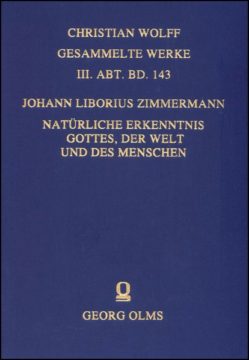Johann Liborius Zimmermann (1702 – 1734) studierte Philosophie und theologische Moral an der Universität Jena. Dort wurde er 1725 mit einer philosophischen Dissertation promoviert und lehrte anschließend alle Gebiete dieses Fachs. Nach einer kurzen Tätigkeit als Hofprediger des Grafen von Wernigerode wechselte er 1731 zur Universität Halle, wo er bis zu seinem Tode praktische Theologie lehrte.
Zimmermann greift im vorliegenden Traktat, der sich methodisch strenger, an Wolffs Methodenideal anknüpfender Prinzipien bedient, einerseits sehr frei – eklektisch – auf Wolffs Topoi in dessen Metaphysik zurück und bleibt andererseits Grundüberzeugungen treu, die sich der Tradition des Thomasianismus verdanken, insbesondere was die praktische Ausrichtung und Nützlichleit der Philosophie betrifft; darüberhinaus wird gerade diese Ausrichtung unter pietistischem Einfluss noch theologisch überhöht. Dies verleiht insgesamt seiner Metaphysik eine singuläre Gestalt.
***************
Johann Liborius Zimmermann (1702-1734) studied theology and theological morals at the University of Jena. In 1725 he gained his doctorate in philosophy and went on to teach in all areas of this subject. After a short period as court preacher to the Count of Wernigerode, he moved in 1731 to the University of Halle where he taught practical theology until his death.
In this treatise Zimmermann, who uses stricter principles based on Wolff’s ideal method, in part refers very freely – eclectically – to the topoi in Wolff’s metaphysics and in part remains true to basic convictions from the tradition of Thomasianism, especially where the practical orientation and usefulness of philosophy are concerned; in addition, this very orientation, influenced by Pietism, is elevated in theological terms. All of this lends his metaphysics a singular character.
- Veröffentlicht am Dienstag 12. November 2024 von Olms, Georg
- ISBN: 9783487138350
- 858 Seiten
- Genre: Aufklärung, Hardcover, Philosophie, Renaissance, Softcover
